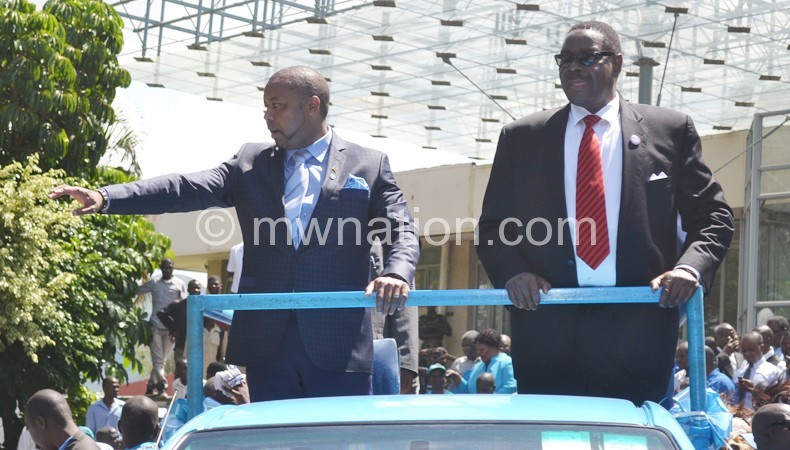Can Peter’s DPP revamp Malawi?
There was little to hope for the survival of the Democratic Progressive Party (DPP) which, led by late Bingu wa Mutharika, began as a splinter from the United Democratic Front (UDF) in 2005.
Being a minority government from 2005 to 2009, the party found a grand political survival trick in playing to the demands of the populace. It listened; as a result, it got the backing of the civil society, academia, the international community and the public. Simply put, it was the people’s party.

That is why during the 2009 general elections, DPP, like Malawi Congress Party (MCP) during the 1961 general elections, managed a landslide presidential victory and majority in Parliament.
However, the 2009 electoral glory changed everything about DPP. It was no longer the tolerant, caring and accommodative party it used to be. It became arrogant, parochial, cruel, vile and intolerant.
So uncouth was the DPP’s rule that by 2011, it had made the nation a pariah state, Africa’s paragon of a failed state. Development partners suspended aid resulting in untold social and economic woes that left the country limping into an abyss.
The party became synonymous with terror as evidenced by a tag it earned, ‘a party of panga wielding thugs’, who ruled Malawi with a heavy hand.
So disgustingly nepotistic was the party in filling most senior positions in government that only the people from the Lhomwe belt were considered.
Amid these woes, Mutharika died. Dying at a time when DPP’s popularity had hit its record low and analysts dubbing it as the stumbling block, some in the country saw his death as dawn of change. Change, really, dawned with Joyce Banda in power.
However, two years outside power did not prove a nail on DPP’s coffin. The party, with Arthur Peter Mutharika at the helm, began to rebuild from fragments of breakaways and tempting arrests it experienced after Bingu’s death.
Commanding neither a rhetorical supremacy nor a history of leadership to envy, the 75-year-old Mutharika played a father figure of party that consolidated its power resting on a tribal base.
Peter’s story
An author, educator, lawyer, adviser and consultant, Professor Mutharika—an expert in international economic law, international law and comparative constitutional law—received his law degrees from the University of London in UK and Yale University in USA.
His life had only revolved around teaching, researching and publishing legal entries.
For instance, as a professor, he has taught at the University of Dar es Salaam (Tanzania), Haile Selassie University (Ethiopia), Rutgers University (USA), the United Nations Institute for Training and Research Programme for Foreign Service Officers from Africa and Asia at Makerere University (Uganda), and Washington University (USA), and has served as an Academic Visitor at the London School of Economics in UK.
His first taste of public leadership came in 2008 when his brother, Bingu, appointed him [Peter], as his adviser on constitutional affairs.
The experience was, again, his entry into politics, during the 2009 general elections, he contested and won a parliamentary seat for Thyolo East. Between 2009 and 2012, he served in three ministerial positions namely Foreign Affairs, Education and Justice.
Peter’s political philosophy
Elected DPP torchbearer during the convention in 2013, Peter’s committed himself to giving life to the party’s belief and values which are grounded on ‘people-centred development approaches, long term infrastructure developments, people-driven economic paradigms, and a culture of respect for human rights and human dignity for all’.
Driven by the same old vision of transforming Malawi from ‘being a predominantly importing and consuming country to a predominantly producing and exporting country’, Peter’s DPP sees a food self-sufficient Malawi where hunger is eliminated and wealth is created through value-adding agricultural products.
To achieve this, DPP has pledged a number of interventions that it will put in place in its 100 days.
Here are some of their key promises:
—A 20-member Cabinet, including deputies, whose appointment will be based on merit, interview and vetting by a Public Appointments Committee.
—Appointment and removal of the governor of the Reserve Bank of Malawi, director of the Anti-Corruption Bureau, the auditor general, the Director of Public Prosecutions, clerk of Parliament, Malawi Human Rights Commission executive secretary, the Malawi Law Commissioner, director general of the Malawi Broadcasting Corporation, Macra director general, and leaders of other accountability institutions shall be on merit through a special Public Appointments Committee.
—Reduce concentration of power in the presidency.
—Cooperate and collaborate with the civil society, non-governmental organisations and the media in the development of Malawi.
—Pass and implement the Access to Information Bill.
—Pass and implement the recommendations from the constitutional reviews, including facilitating implementation of revised Section 65 (Crossing the Floor automatically) and bring back the revised Section 64 (recall provision with proper safeguards to prevent abuse) of Constitution.
—Establish a National Security Council with statutory powers to guide long-term national decision-making and determination of government actions for national interests, the well-being of our people and institutions, and our sovereignty and territorial integrity.
—Double exports in the next five years.
—Sustain fertiliser subsidy for the poor in Malawi but through abolishing the coupon system and make subsidised fertiliser available for every maize subsistence farmer that needs it.
—Introduce health insurance for all public servants
—Introduce and implement a subsidy on cement and iron sheets to empower the poor in Malawi to build and own decent houses.
—Facilitate the development of mini-taxis, which will not only ease transportation, but will also create jobs, reduce congestion and grow a service sector along the way.
—To pass and implement a number of laws including: a law on handouts, and a law that will prevent sitting members of Parliament from benefiting from increasing their own salaries and benefits.






Did Joyce’s PP revamp Malawi